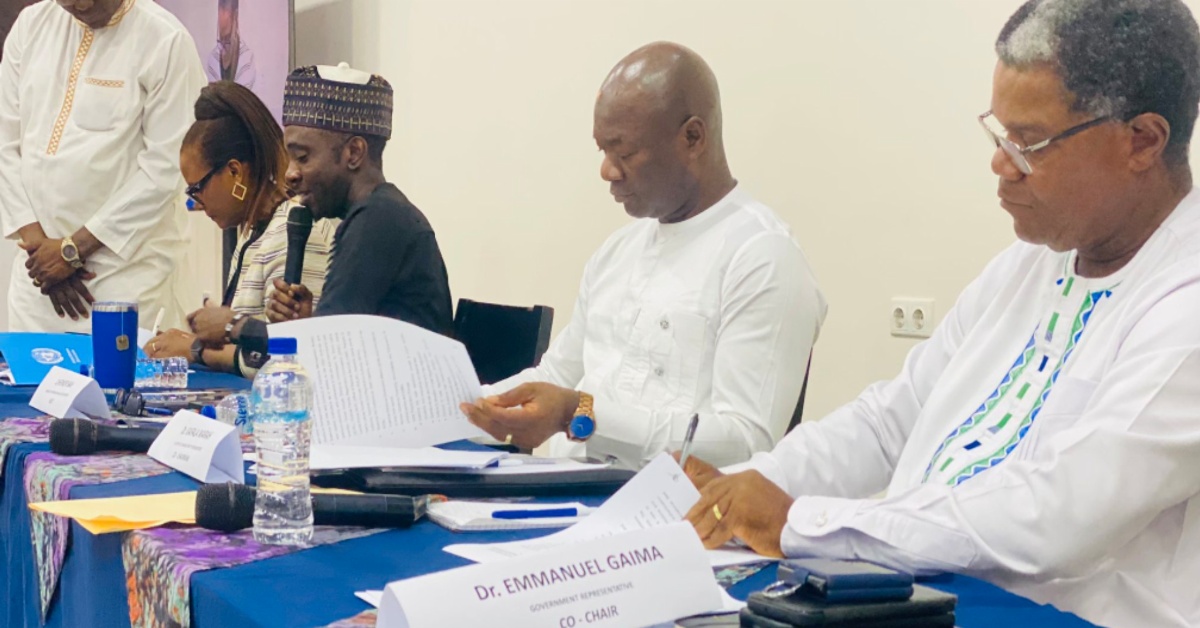Sierra Leone’s electoral saga, Dr. Kaifala Marah, representing All People’s Congress (APC), and Dr. Emmanuel Gaima, representing the Government, clashed over the scope and powers of the Tripartite Committee on Electoral Reforms.
The discord arose during the signing of the committee’s Terms of Reference at the weekly press conference organized by the Ministry of Information and Civic Education in Freetown today, 6th February, 2024.
At the center of the disagreement is the committee’s intended examination of the June 2023 elections, including scrutinizing data released by the Electoral Commission of Sierra Leone. Dr. Marah was adamant about the committee’s mandate, stating, “We have a mandate to examine or investigate. Whatever comes out will be based on the recommendations we will make.” This assertion underlines the APC’s commitment to a thorough review of the electoral process.
However, Dr. Gaima vehemently opposed subjecting the Electoral Commission to an investigation, arguing that the committee lacked the authority to do so. This stance reflects the Government concerns over the perceived overreach of the committee’s powers and its potential implications for electoral integrity.
The contrasting positions of the government and the APC representatives cast a shadow over the committee’s ability to carry out its mandate effectively. Dr. Marah’s insistence on examining the elections clashes with Dr. Gaima’s assertions, creating an atmosphere of mistrust and uncertainty surrounding the committee’s proceedings.
In an effort to bridge the divide, Dr. Marah appealed to the government for collaboration in implementing the committee’s resolutions. “We crave the indulgence of Government to collaborate with us to implement some of the resolutions so that people will have trust in the process,” he emphasized. This plea underscores the importance of political cooperation in ensuring the credibility and transparency of electoral reforms.
Despite these efforts, the underlying tensions between the government and the APC representatives suggest that significant obstacles lie ahead for the Tripartite Committee on Electoral Reforms. The conflicting interpretations of the committee’s mandate and powers highlight deep-seated divisions within Sierra Leone’s political landscape, raising concerns about the prospects for meaningful electoral reform.
Moreover, the public exchange of opposing viewpoints at the signing of the committee’s Terms of Reference sends a troubling signal about the state of democracy and governance in Sierra Leone. The inability of key stakeholders to reach consensus on fundamental issues related to electoral reform bodes ill for the country’s democratic future.
As Sierra Leone grapples with these challenges, it is imperative for all parties involved to prioritize the interests of the electorate above partisan considerations. Achieving genuine electoral reform will require a concerted effort to overcome differences, foster dialogue, and uphold the principles of fairness and accountability.
In the coming weeks and months, the Tripartite Committee on Electoral Reforms will face the daunting task of navigating these complex dynamics while charting a path forward for Sierra Leone’s electoral system. The outcome of their deliberations will have far-reaching implications for the country’s democratic development and political stability. Only time will tell whether the committee can rise above the discord and deliver meaningful change to the electoral process.












Honestly this is a delaying strategy intended to be used to undermine Democracy in our beloved nation. Committee no committee the thing is simple here. Konneh just need to explain to the public about how he arrived at the figures that made Bio to worn the June 2023 election simple.
The problem began since 2018 when PR system was technically used by the court to remove some members of parliament who were democratically elected. If this Government stands for democracy why not conducting elections by then instead of using the court? Am I correct to say that the PR system came into effect before it was tabled in parliament 2023?
Remember the Counselor’s seat saga at Thonko Limba in 2019, the figures were manipulated and the SLPP candidate was announced the winner. Northing comes out of it. Is that Democracy?
The government’s step to introduce electrical reforms committee is a strategy to delay the process, undermine Democracy and fool the people. Look APC, H.E. Bio is not even taking you guys serious instead he is making laugh at you trust me he is not ready for a rerun. No no he is not thinking about it, APC pray that Bio will not contest against you in 2028 again..
We are watching to see how the film will end.
Please papa government we want to hear better things, elections are over until 2028 or 2029. We need a better standard of living now, the masses are suffering you guys are busy and wasting time on electoral matters.
Any body that love 💕 Sierra Leone knows this present government is undemocratic and a virus to the nation